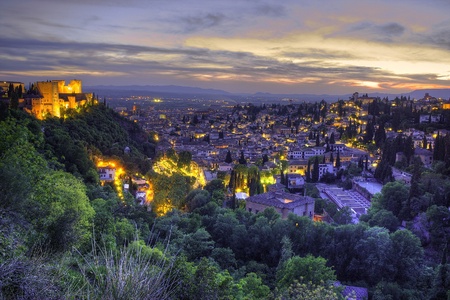This is a past event
With Dr Matthew Machin-Autenrieth - University of Aberdeen
In 1939 at the end of the Civil War, the city of Granada, a symbol of nationalist victory for Franco’s forces, hosted an Exposition of Hispano-Moroccan artistic industries, featuring Moroccan and Granadan arts and crafts. Connected to the Spanish ‘protectorate’ in Morocco, the event was promoted in the Francoist press as a homage to the ‘brotherhood’ between the two countries. The performance of Arab-Andalusian music was central to this brotherhood given the tradition’s links to the shared history of Muslim Spain (or al-Andalus). In 2019, I attended an activist event in Granada called Arde la memoria (The Memory Burns), which commemorates through poetry and music, historical attempts to destroy the written memory of defeated peoples in Spain and confronts the country’s fascist past. Here, a musical brotherhood was once again invoked through Arab-Andalusian music as a symbol of intercultural dialogue. The rhetoric of musical affinity and intertwined musical histories underpins both these events; one set against the backdrop of colonialism and fascism, the other against the backdrop of left-wing activism and social democracy.
Taking these two events as a point of departure, this presentation examines how the trope of a Spanish–Moroccan brotherhood is performed through music, weaving in and out of history, and traversing incompatible and conflicting ideologies. The notion of a musical brotherhood was instrumentalised to legitimise Franco’s colonial agenda, while at the same time strengthening Moroccan nationalism that lead to independence in 1956. Moreover, the trope of brotherhood still criss-crosses the Strait of Gibraltar influencing projects of cultural diplomacy, intercultural music making amongst Moroccan migrants and left-wing activism. Interweaving archival and ethnographic research, this presentation considers how the legacies of Spanish colonialism in Morocco continue to influence contemporary music making in Spain in often quite contradictory ways.
Matthew Machin-Autenrieth is Lecturer in Ethnomusicology at the University of Aberdeen and the Principal Investigator for the European Research Council-funded project ‘Past and Present Musical Encounters across the Strait of Gibraltar’ (2018–23). He completed his Masters and PhD in Ethnomusicology at Cardiff University. Following his studies, he was appointed as a Leverhulme Early Career Fellow at the University of Cambridge (2014–18) before becoming a Senior Research Associate from 2018–20. In 2020, he was appointed to a lectureship at the University of Aberdeen.
This seminar will be held on Microsoft Teams. You don’t need a Teams account to attend, just click on the link below shortly before the advertised start time and follow the instructions:https://teams.microsoft.com/l/meetup-join/19%3ameeting_NmM0YjQ0ZDMtNTJjNi00NGM2LTgyMDMtNTliZjYwZDM4YmEy%40thread.v2/0?context=%7b%22Tid%22%3a%228c2b19ad-5f9c-49d4-9077-3ec3cfc52b3f%22%2c%22Oid%22%3a%2238884336-2214-482a-af18-ab9eedde6b19%22%7d
If you have any questions or technical difficulties, please email jonathan.hicks@abdn.ac.uk
- Venue
- On LIne Live Stream

